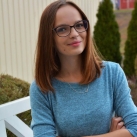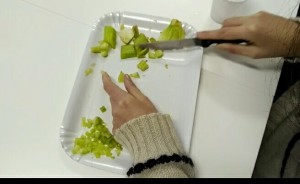Diana

“Add something to the world that only you can add”
(phrase seen in Cremona, Italy)
My name is Diana, and I am an EVS volunteer from Ukraine. The decision to volunteer came to me when I was 7 years old, and I perfectly remember this evening – the truth, I dreamed of Africa; who knows, maybe I can get there. Volunteering for me means that selfish behavior can also be altruistic. Man, based on his personal goals, still has a “desire” = volunta to help and bring a bit of joy in the lives of others. In any case, I really hope that my project will be like this.
In this article, I want to share my first observations and analysis of the EVS experience. Of course, in major part, EVS is a youthful, energetic and fun experience. However, I would like to write about the deeper phenomena, which, in my opinion, are the basis. So:
5 reasons why it is worth to be an EVS volunteer
(The following is randomly ordered.)

- Intensity. A volunteer project is clearly deterministic, it has a precisely designated beginning and ending. As with our … life – we prefer to forget and ignore that it has an end. As Irvin Yalom (existential psychotherapist) wrote, “the idea of death saves a person’s life“, so that a real knowledge of what this experience is the finale, gives an extraordinary intensity to everything that happens and an acute sense of “here and now.” You do not think about the “after”, but try to realize everything is planned, do not hesitate long before saying “yes” and agreeing to a crazy adventure.
Furthermore, you are open and active, ready to learn about the world around you, in a word – live with might and meaning. Exactly this intensity cannot be compared with anything you experienced before. Because it is an opportunity to live a small life that is an integral part of your big and old life. You are living.
- It is just you. You will spend a lot of time with yourself, confronting yourself, as well as seeing different sides of yourself, even if you are a master of avoidance and departure from reality. Because when everything around you is unknown and incomprehensible (language, culture, customs), you will have to turn to a single familiar space = to yourself.
Moreover, if you set yourself vital questions, then it’s a wonderful opportunity to find answers to them. If you have a little bit of reflection (and everyone is capable of it), you can analyze your strategies of behavior in problem situations and conflict solving, distinguish the true and false goals. Try to understand where social pressure ends and your own desires begin.
You can find out what exactly is right for you. In this situation of dissociation, there is always a better chance to take a comprehensive look at the situation, your life. Of course, you will have time for a hobby. In addition, you will have time to improve your professional skills or try something completely different. It will be only you and your time!
- Values. Your system of values ”before”, directly “during” and in the “end” of the project will be very different. This applies to material and spiritual values both. Let’s start with the material ones: you are a volunteer, which means that you are simply limited in material resources. You should learn to determine what is really important for you, and without which things you can live. Maybe you can give up something, but it may happen that you overestimate the significance of something and will want to keep it just obsessively. You can think that life is very complicated without the usual things, but one day, without warning (and this will happen) you will just feel completely happy without them. I can guarantee you, that you will be out of your comfort zone, revaluating material and social benefits.
A little bit about other values … you are far from your family, relatives, friends. You will probably reconsider your relationship with them, understand the importance of other things, for example, how much a simple hug means. You will come into contact with the culture and values of another country – and believe me, they will remain forever with you. And for sure, expand your worldview and the ability to understand others.
- Personal capital. In the book “The Defining Decade” by Meg Jay (I highly recommend it), she is using the term of “identity capital” – a collection of personal assets and investments that we make in ourselves. She says, we can build this capital by collecting a variety of experiences, including volunteering. There is no need to write about many things, the main idea, that it is a kind of piggy bank in which all the knowledge and experience will be, that will help you approach the best version of yourself.
- Relationships. Relations with people in general, but especially with participants in your project. Many EVS projects imply that they involve several volunteers from different countries who live in the same place (as in my case). You have the opportunity to learn how to build close and sincere relationships with them (this is an opportunity, because if there is no desire, you can continue to use well-known “tricks”).
During the project, you and them will know yourself the best and most – sometimes even better than old friends or relatives. After all, you will be together 24 hours a day, 7 days a week. Then you can observe the dynamics of the development of these relationships: at times you will regress, and regardless of how old you are, will behave like a real child, illogical, too crazy and sensitive. There will be a lot of misunderstanding, and not just because you are from different cultures (which is understandable), but simply because we are people and there is nothing more complicated and exciting than human relations. You will try your best in these relationships, first out of selfish motives “because you will have to live with this person for a year”.
At one point this moment will come (and it will come for sure!), when you suddenly notice that you care about each other simply because you are not indifferent to this entirely different planet. Here you have your intercultural exchange.
Thank you for reading till end. And the last … result … in a word – only you decide … when and where to start your EVS. 🙂
Thanks to my English redactor Lina Al-Akel. 😉




